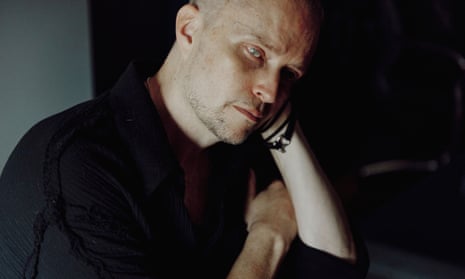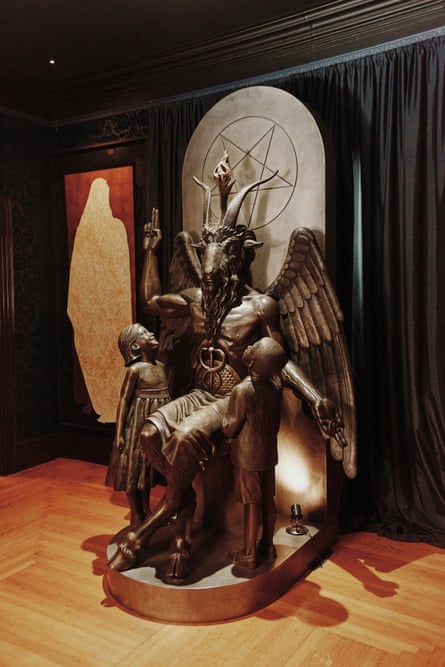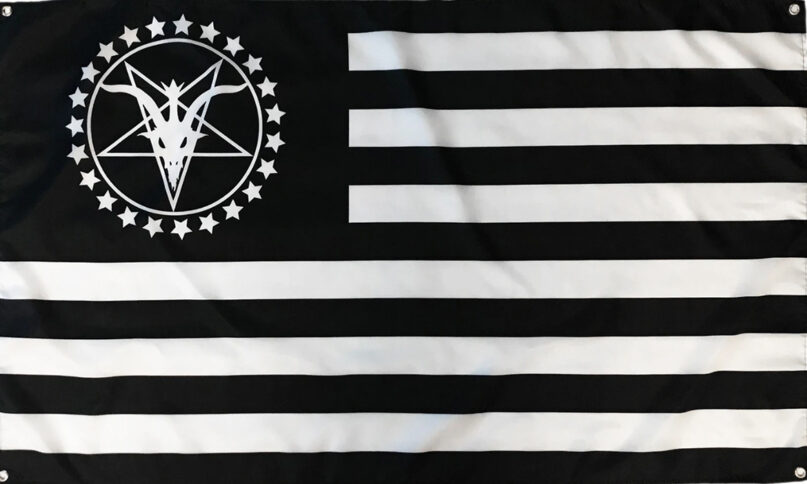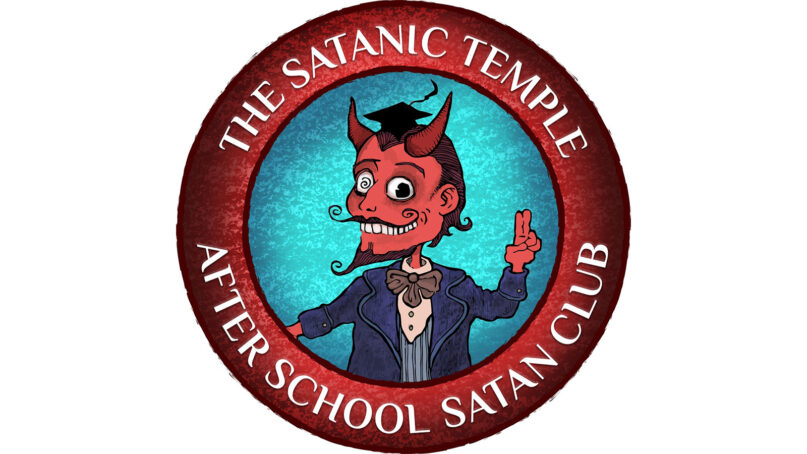Friend of Satan: how Lucien Greaves and his Satanic Temple are fighting the religious right

They have protested against a homophobic church and opposed prayer in classrooms. Now this minority religion is defending the right to abortion
Adam Gabbatt
@adamgabbattWed 4 Jan 2023
A statue of Baphomet – a pagan idol used in popular culture as a representation of the devil, with the head, horns and feet of a goat, the torso of a man and the wings of an angel – is the centrepiece of the Satanic Temple’s headquarters in Salem, Massachusetts.
More than 8ft (2.4 metres) tall, jet black and altogether unnerving, Baphomet serves as a reminder of what brought the Satanic Temple to fame. In 2013, the group, which is acknowledged as a religion by the US government, responded to the installation of a Ten Commandments monument on the grounds of the Oklahoma state capitol building – seemingly a flagrant abuse of the US constitution’s separation of church and state – by demanding that its own Baphomet statue also be positioned in the grounds. According to the first amendment, which protects freedom of religion, public spaces should be open to all religions or none, it argued.
It turned out that Republican politicians did not want a big statue of a goat-headed pagan deity on capitol grounds. Amid lawsuits, the Oklahoma supreme court eventually ordered that the Ten Commandments monument should be removed.
The tactic, with its wry and anarchic undertones, is typical of the Satanic Temple’s battle against the religious right in the US. In the decade since the spat over the statue, the Temple has tackled prayer in classrooms, religious holiday displays and the distribution of Bibles in schools.
Now, it is taking on another fundamental issue: the right to abortion.
The overturning of Roe v Wade last June opened the door for more than half of US states to effectively ban abortion or restrict access to it, horrifying supporters of reproductive rights. The Satanic Temple – and many other observers – believe the decision of the supreme court was made on the basis of religion: specifically the extreme form of Christianity that has come to dominate Republican politics in the US.
The Temple has “seven fundamental tenets”, one of which states: “One’s body is inviolable, subject to one’s own will alone.” This, it believes, offers a way around these draconian new laws. It is arguing that its members are exempt from bans or restrictions on abortion, due to their right to a “Satanic Temple religious abortion ritual”, more of which later. With lawsuits already filed in Indiana, Idaho, Texas and Missouri, the Satanic Temple is about to find out whether US courts agree.

Legal battles are long-running, expensive and frustrating for people desperate for immediate change. But Lucien Greaves, who co-founded the Satanic Temple in 2012, points to the success the Republican party has had in overturning Roe v Wade – a decision brought before the court through decades of lobbying and legislating.
“I get messages from people denigrating us for taking legal action to assert our rights, saying: ‘You can’t change the system from within the system,’” Greaves says.
“And I keep asking them: ‘What the fuck do you think you just saw happen? That’s what they just did.’”
Tall, slim, pale and dressed in black, Greaves is a fitting frontman for a group that is regularly demonised by its Christian opponents. A leather strap wrapped around his wrist, his thin blond ponytail tied up with black bands, he could be in one of the heavy metal bands that terrified neurotic parents in the 1980s and 90s.
“We have to play the long game,” Greaves says. “They spent generations doing this.”
Satanists don’t believe in Satan in a literal, demonic sense, Greaves explains, but rather as a symbol of rebellion and opposition to authoritarianism. According to the Satanic Temple’s website: “To embrace the name Satan is to embrace rational inquiry removed from supernaturalism and archaic tradition-based superstitions.”
The Satanic Temple held its first public activity in January 2013, and a decade on it has more than 700,000 members, with congregations in 24 states and six countries, including the UK, Germany and Finland.

The organisation is recognised by the US Internal Revenue Service as a “church or a convention or association of churches” and, as such, it is able to highlight, and attempt to tackle, the disparity in how Christianity is treated compared with other religious groups in the US.
“Right now, we have a minority religious theocratic movement, so entrenched in politics and getting away with whatever they want,” Greaves says. “Now they’ve got the courts on their side and everything – and they don’t need to bend to the will of the majority.”
He is speaking to the Guardian at the Satanic Temple’s headquarters, a three-storey former funeral parlour ringed by neatly trimmed lawns and topiary. The building is not hard to spot. In a residential area where most of the traditional, clapboard homes are cream or white, it is painted black.
The interior matches the gothic exterior. The walls are covered with dark, velvety wallpaper, and daylight is shut out by floor-length crimson curtains. Baphomet lurks in one room, ready to be summoned once more. A gift shop sells “Friend of Satan” mugs, “Hail Satan” T-shirts, and “Satanic Temple official hot sauce”, which comes in four flavours and costs $12 (£10) a bottle. Upstairs, a chandelier-lit throne room features grand mahogany chairs flanked by Norse helmets. The space is also available as a wedding venue, and newlyweds can spend the night in a vampiric-looking bedroom suite.

Greaves, who uses a pseudonym as a result of threats, somewhat reluctantly became the Satanic Temple’s spokesperson in 2013, the year after it was founded. The organisation quickly became known for its anarchic activities. That same year, it praised the governor of Florida for having signed a bill allowing students to lead prayer at school assemblies. The decision, the Temple said, was exciting – “because now our Satanic children could pray to Satan in school”. Faced with the threat of litigation from civil rights organisations, it is unclear if any school districts ever took up the student-led prayer option.
That same year, the group held a mocking “pink mass” to protest against the notoriously homophobic Westboro Baptist Church, and specifically its founder, Fred Phelps. The mass featured two men kissing over the grave of Phelps’ mother.
In 2016, in response to hundreds of schools hosting after-class Bible study groups (mostly promoted by the Good News Club, a weekly Christian programme for children), the group announced it would offer its own after-school Satan clubs. The clubs, which are “designed to promote intellectual and emotional development”, are still around: last year there was much purse-clutching when a school in Ohio gave the go-ahead for an After School Satan club.
In recent years, though, the Temple has moved beyond physical stunts, and into the courtroom, spending hundreds of thousands of dollars on legal efforts to secure abortion rights, ensure the right to free speech and protect children from abuse.

“It’s getting really frustrating now with the overturn of Roe v Wade, when people are still treating us not like we’re a minority religion – which we are – but more like, we’re just this kind of clever tactic that may or may not work,” Greaves says.
“That gets to be really tedious, because I think people aren’t terribly invested in the outcomes of the Satanic Temple’s lawsuits. And it shows that they don’t understand that the outcomes of what the Satanic Temple is doing have ramifications for everybody: all minority religious organisations, all different types of viewpoint positions that might be outside the Christian nationalist perspective.”
In recent years, Republicans have ushered in a wave of discriminatory, pro-Christian legislation in states across the country. Conservatives have targeted LGBTQ+ people, in particular, with efforts to prevent transgender people using certain bathrooms, and to prevent LGBTQ+ couples from adopting children. Many of these bills are lifted from model legislation drafted by Christian lobbying organisations under an effort known as “Project Blitz”.
It is this religious crusade that ultimately resulted in the supreme court’s 6-3 conservative majority overturning Roe v Wade, with its Dobbs v Jackson Women’s Health Organization ruling, which held that the constitution of the United States does not confer a right to abortion.

That is where the Satanic Temple is hoping to find some leeway. It has insisted that its members do have a religious right to receive abortions, as part of its “Satanic abortion ritual”. The Temple’s “fundamental tenet” that “one’s body is inviolable, subject to one’s own will alone” is a position that contradicts people being denied the right to end a pregnancy.
During the ritual, the person having the abortion looks at their reflection, before taking deep breaths and reciting two of the seven tenets. Once the abortion is complete, the person must recite the “personal affirmation”: “By my body, my blood, by my will, it is done.” The ritual is conceived to serve an “affirmative function of assuring membership that their decision is their own”, the group says, while also offering a kind of counselling effect.
Once someone determines they want to undergo the abortion ritual, the Satanic Temple believes that the state has no right to intervene in what is essentially a religious practice.
“States are passing laws premised on this idea that foetal tissue has personhood, or is a unique and distinct human life. We don’t agree with that position. We believe it’s a religious position, and we don’t believe states have any right to put any impositions on us,” Greaves says.
Opinion polls, and results such as last August’s Kansas ballot – in which a majority voted in favour of keeping abortion legal in the state – show that most Americans think abortion should be legal, and the Roe v Wade decision sparked protests across the country. This might have buoyed those involved, but Greaves – speaking in a personal capacity, rather than on behalf of the Satanic Temple – thinks it is unlikely to change the opinions of rightwing politicians and courts.
“You’re not going to wave signs now and shame the Republicans into acting rationally,” he says.
The documentary Hail Satan?, released in 2019, helped increase the Temple’s popularity and membership, but exposure has also brought problems.
In June, the Satanic Temple headquarters was subject to an arson attack . A man wearing a T-shirt that read “God” walked up to the front porch, poured an unknown accelerant over it, then set it on fire. The Satanic Temple’s door cam recorded the whole thing. A man was arrested the same night, and has been charged with arson, destruction of a place of worship and civil rights violation charges. If he was genuinely trying to burn down the building, it was a lamentable effort, but the incident was a reminder of the risks the Satanic Temple faces. As the organisation’s visible figurehead, Greaves is particularly – and literally – in the line of fire.
“I honestly felt like I was committing suicide at the point where I was being the public face of satanism, because I’ve seen people’s lives totally ruined on accusations of satanism,” he says.

Greaves recently came to the attention of the Sovereign Citizens, a loose group of Americans who do not believe they are under the jurisdiction of the federal government, and are not subject to US law. According to the Southern Poverty Law Center, the movement is “rooted in racism and antisemitism” and “some sovereign citizens have turned to violence”.
In late 2021, Greaves received a message from the group that informed him he was to be deported from the US.
After finding a Zoom link for a Sovereign Citizens assembly meeting, Greaves gatecrashed it, and managed to derail the meeting almost immediately by taking on a chairman role and calling it to order. “I suppose you’re all wondering why I gathered you here today,” Greaves said, before being told to “Shut your damn mouth,” by a Sovereign Citizen.
Greaves was eventually ejected from the meeting, which bore all the professionalism of a parish council get-together. Soon after, he says, a $100,000 bounty was placed on his head. A notice on the American Herald news site stated Greaves was wanted “dead or alive”, and called him “a domestic and international terrorist”.
People who post death threats in plain sight could seem like harmless cranks, but Greaves points out that plenty of violence has been committed in the name of quackery: “I don’t know how to distinguish what is more and less serious unless somebody actually comes in and does something.” If a person does attack him, Greaves says: “It’s gonna be someone this dumb.”
He is forced to take precautions nowadays. Last year he moved – “very secretly”, he says – and he tries to keep personal details as personal as possible. But he and his fellow satanists are undeterred. The Satanic Temple will keep chipping away at the inroads the Christian right have made. This religion, one of the most curious churches in a country full of them, is in it for the long haul.
“We have a lot of work to do to bring shit back to a reasonable level. And we’re not close to that right now,” Greaves says.
“It’s going to take many years to undo the damage that has been done. But that’s the opposite of an excuse to give up. There’s no excuse to not be engaged right now.”








